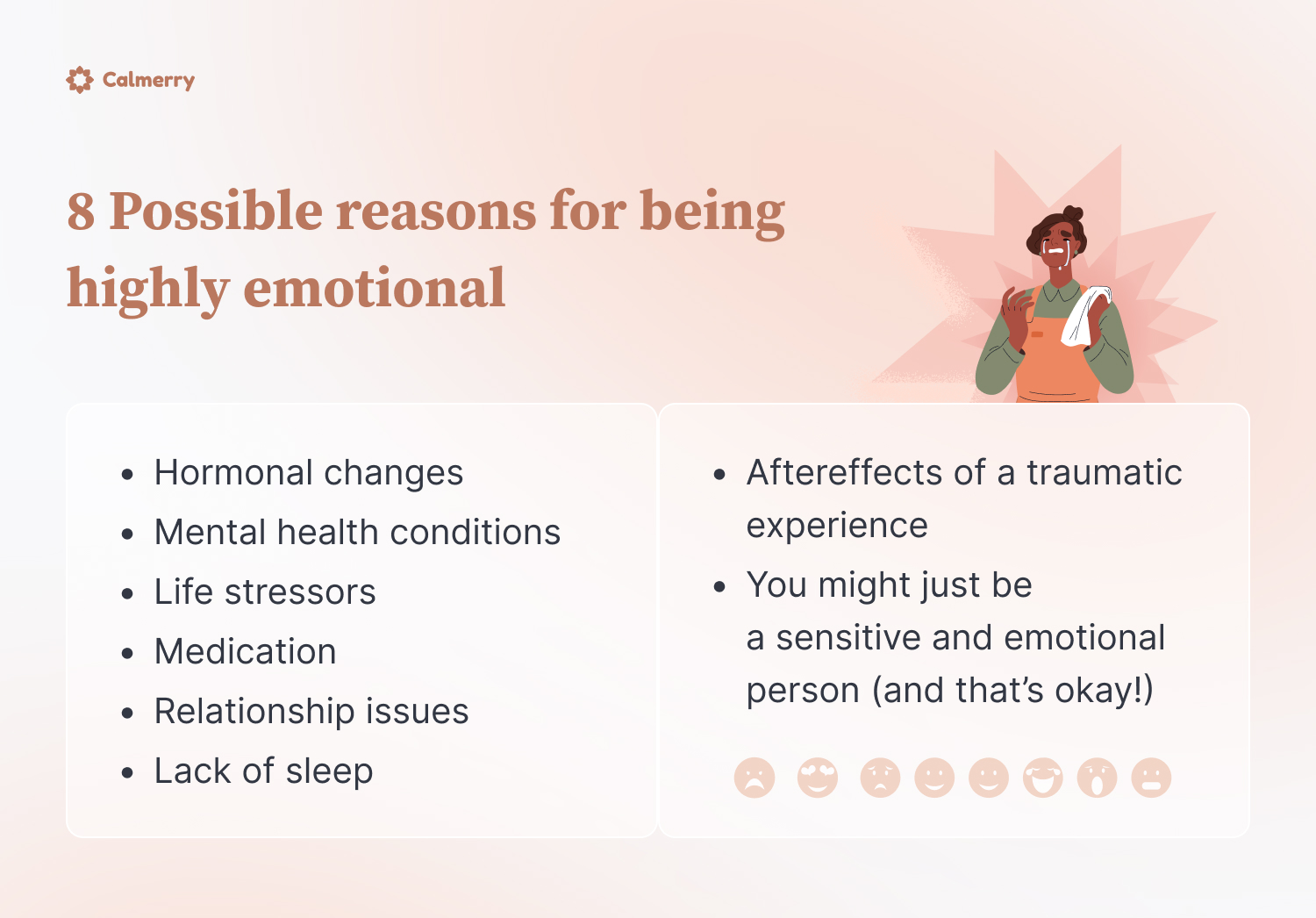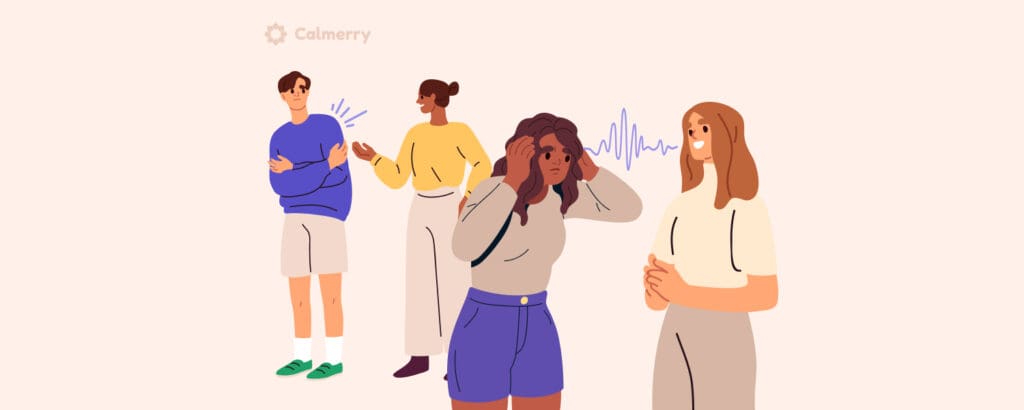Why Am I So Emotional? 8 Possible Causes and What to Do

In this article
The science behind human emotions is fraught. Some believe that emotions are biologically driven reactions to the world around us, which evolved to help humans survive.
Many emotions appear to be universal across culture and habitat – and even show up among non-human animals. [1] Universal Emotions | What are Emotions? | Paul Ekman Group. (2023, May 1). Paul Ekman Group. https://www.paulekman.com/universal-emotions/
For example, dolphins and orcas appear to be playful, lonely, cheerful, and affectionate. Elephants have been observed to express profound joy and sorrow. Baboons can become depressed. Pigs can be filled with terror. Rats may come to each other’s aid when distressed. And fish have been known to seek out caresses to relieve stress.
However, emotion researcher Lisa Feldman-Barrett has complicated the theory that emotions are hardwired. In her decades of research, Dr. Feldman-Barrett has found that emotional responses are learned based on our experiences and social knowledge.
Can we be too emotional?
Starting in childhood, many of us get the message that our emotions are bad. When we’re angry, we’re told to “calm down,” and when we’re sad, we’re told, “It’s not that bad.”
As a result, we learn to push our emotions down, creating a dark underworld of inauthenticity, disconnection, mental health conditions, and physical health issues. [2] Patel, J., & Patel, P. (2019). Consequences of repression of emotion: physical health, mental health and general well being. International Journal of Psychotherapy Practice and Research, 1(3), 16–21. https://doi.org/10.14302/issn.2574-612x.ijpr-18-2564
While we might be worried that we’re “overly emotional,” ignoring or suppressing our emotions can lead us astray. [3] Marc Brackett, Ph.D. (2020, April 14). Permission to Feel Book | A guide to understanding emotions (EQ) for adults and children. https://www.marcbrackett.com/about/book-permission-to-feel/ Our emotions offer important cues that can help us navigate our lives and:
- Build healthy relationships
- Live by our values
- Reach our goals
- Cultivate well-being
From this lens, it makes sense to develop the tools and skills to access, express, and regulate our emotions.
However, when a person lacks these tools and skills, they may be labeled as “too emotional” and react in ways that harm their relationships and life goals.
– Kate Dubé, Licensed Clinical Social Worker (LCSW)
What’s more, a person might develop:
- Insomnia
- Increased conflict
- Lack of motivation
- Oversharing
- Defensiveness
- Physical aches and pains
- Changes in weight
- Difficulty with self-care

8 Possible reasons for being highly emotional
Hormonal changes
The natural ebb and flow of your hormones can cause changes in your mood and emotional sensitivity.
Take the case of premenstrual dysphoric disorder (PMDD), which affects 3-8% of reproductive-aged women. [4] Mishra, S. (2023, February 19). Premenstrual dysphoric disorder. StatPearls – NCBI Bookshelf. https://www.ncbi.nlm.nih.gov/books/NBK532307/ The cyclical shift in hormones can cause severe irritability, depression, and anxiety in a week or so before your period and then go away after it starts.
Mental health conditions
Mental health conditions intertwine with a person’s emotional state, which can lead to magnified emotions or challenges in managing your feelings.
Emotions such as anger, sadness, fear, and even joy can become intensified and feel overwhelming.
Stress
Challenges at work, school, or home, as well as life transitions and other stressors, can affect your mood and lead you to feel more emotional than usual.
Stress can also reduce your resilience and create a sense of overwhelm that makes it more difficult to cope with even minor challenges.
Medication
Certain medications have side effects that can cause changes in your mood. If you think this might be the cause of an emotional shift, let your prescribing doctor know right away.
Relationship issues
Falling in love, beginning or ending a relationship, navigating through life with a partner, or being single and seeking a relationship can each be a breeding ground of emotional turmoil.
Pheromones, hormones, mirror neurons, and other factors such as vulnerability, trust, conflict, and gender identity can all interplay to impact your emotional state.
Lack of sleep
Sleep is essential for your physical and mental health. Losing as little as an hour of sleep can cause a dip in your mood, energy, ability to concentrate, and capacity to regulate your emotions. [5] Saghir, Z., Syeda, J. N., Muhammad, A. S., & Abdalla, T. H. B. (2018). The amygdala, sleep debt, sleep deprivation, and the emotion of anger: a possible connection? Cureus. https://doi.org/10.7759/cureus.2912
Trauma
When an event or experience overwhelms your central nervous system and changes the way that you react to stimuli, this is called trauma. People who are coping with the aftereffects of a traumatic experience may have emotional reactions that seem disproportionate to the situation.
What’s more, feelings such as anger, shame, and irritability are symptoms of post-traumatic stress disorder. [6] Post-Traumatic Stress Disorder. (n.d.). National Institute of Mental Health (NIMH). https://www.nimh.nih.gov/health/topics/ptsd
Your temperament
Whether it’s your genetics, your experiences, or a mixture of both, you might just be a sensitive and emotional person. [7] Cloninger, C. R., Cloninger, K. M., Zwir, I., & Keltikangas‐Järvinen, L. (2019). The complex genetics and biology of human temperament: a review of traditional concepts in relation to new molecular findings. Translational Psychiatry, 9(1). https://doi.org/10.1038/s41398-019-0621-4 No need to try to shapeshift or become someone you’re not – embrace who you are and the gifts that come with it.
8 ways to cope with your emotions
When you’re overwhelmed by your emotions, you might be tempted to ask, “How do I stop being so emotional?”
But let’s think about reframing this question. Another way to approach the issue is to learn how to experience your emotions, learn from them, channel their energy in healthy ways, and not get toppled over when they become big and swirling.
Below are 8 ways that you can practice coping with your emotions.
HALT
First things first. Before you try any of the methods below, check in with yourself to see if your basic needs are being met. You can do this by remembering the acronym HALT, which stands for:
- Hungry
- Angry
- Lonely
- Tired
If you haven’t eaten in a while, nourish yourself. If you’re angry at your boss, allow the feeling to dissipate. If you’re feeling lonely, reach out to a friend. And if you’re tired, get some rest.
Connect to a sense of purpose
Feeling a sense of purpose can offer a direction in life and act as a buoy when your emotions become overwhelming.
Whether it’s a professional goal, a code of ethics, or a strong set of values, having a purpose can buffer the effects of stress and help you recover from difficult experiences. [8] Hill, P. L., Sin, N. L., Turiano, N. A., Burrow, A. L., & Almeida, D. M. (2018). Sense of purpose moderates the associations between daily stressors and daily well-being. Annals of Behavioral Medicine, 52(8), 724–729. https://doi.org/10.1093/abm/kax039 [9] Schaefer, S. M., Boylan, J. M., Van Reekum, C. M., Lapate, R. C., Norris, C. J., Ryff, C. D., & Davidson, R. J. (2013). Purpose in Life Predicts Better Emotional Recovery from Negative Stimuli. PLOS ONE, 8(11), e80329. https://doi.org/10.1371/journal.pone.0080329
Explore your meta-emotions
A meta-emotion is an emotion that occurs in response to another emotion. An example of this is feeling embarrassed after tearing up in a work meeting.
Meta-emotions offer important information about how we make sense of our emotional experiences.If you feel guilty about feeling angry at your child, that guilt provides a cue to explore where your anger came from and how you want to manage it. You might realize that your anger stems from a learned behavior of your own parent, who often erupted in anger when you were little. Or, you might discover that you are overwhelmed with your childcare duties and need more help.
While there are myriad possibilities as to why you feel the way you do, meta-emotions can help you get to know yourself and build awareness around your emotional responses.
Improve your emotional intelligence (EQ)
Emotional intelligence or EQ refers to your ability to know, regulate, and express your emotions as well as to recognize and respond skillfully to the emotions of others.
The ability to manage your emotions has been linked to better mental health, memory, and well-being. [10] Berking, M., & Wupperman, P. (2012). Emotion regulation and mental health. Current Opinion in Psychiatry, 25(2), 128–134. https://doi.org/10.1097/yco.0b013e3283503669 [11] Hayes, J. P., Morey, R. A., Petty, C., Seth, S., Smoski, M. J., McCarthy, G., & LaBar, K. S. (2010). Staying Cool when Things Get Hot: Emotion Regulation Modulates Neural Mechanisms of Memory Encoding. Frontiers in Human Neuroscience, 4. https://doi.org/10.3389/fnhum.2010.00230 [12] Haga, S. M., Kraft, P., & Corby, E. (2007). Emotion Regulation: Antecedents and Well-Being Outcomes of Cognitive reappraisal and Expressive Suppression in Cross-Cultural samples. Journal of Happiness Studies, 10(3), 271–291. https://doi.org/10.1007/s10902-007-9080-3 This can be learned, but it takes practice.
In one program called RULER, people are encouraged to:
- Recognize emotions in themselves and others
- Understand the root of their emotions
- Label emotions with specificity
- Express emotions in ways that are suitable to their environment
- Regulate their emotional responses [13] RULER. (2019, July 23). Evidence for RULER – RULER approach. RULER Approach. https://www.rulerapproach.org/about/what-is-the-evidence/
Allow difficult emotions to surface
While this might initially sound counterintuitive, accepting your feelings and allowing yourself to experience them may actually diminish the impact of difficult and painful emotions. [14] Ford, B. Q., Lam, P. H., John, O. P., & Mauss, I. B. (2018). The psychological health benefits of accepting negative emotions and thoughts: Laboratory, diary, and longitudinal evidence. Journal of Personality and Social Psychology, 115(6), 1075–1092. https://doi.org/10.1037/pspp0000157
What’s more, people who accept their emotions have been found to be less depressed and anxious, and more satisfied with their lives.
To do this, try envisioning your emotions like waves in the ocean. They rise, crest, fall, and pass on their own. So when you feel challenging and intense emotions taking over, pause, slow down, and tell yourself:
- I feel…. (fill in the blank)
- I will minimize the harm
- This will pass
Conversely, suppressing your emotions – or inhibiting the outward expressions of inner feelings – can endanger your physical and psychological health. [15] Patel, J., & Patel, P. (2019). Consequences of repression of emotion: physical health, mental health and general well being. International Journal of Psychotherapy Practice and Research, 1(3), 16–21. https://doi.org/10.14302/issn.2574-612x.ijpr-18-2564 In other words, suppressing an emotion doesn’t make it go away. Instead, it stays inside, causing more pain and suffering.
Write in your journal
Journaling is a structured way of attending to the “whispers of your soul.” [16] C. G. Jung Institute of Chicago. (2023, August 17). Awaken the Slumbering Goddess – Bedi. https://jungchicago.org/bedi-awaken-the-slumbering-goddess/ There’s no right way to journal. Examples of themes you may write about include:
- Daily life
- Dreams
- Meaningful encounters
- Synchronistic events
- Experiences of gratitude
- Stressors
Practice mindfulness
Today, you might be on top of the world, and tomorrow, you feel like you’ve fallen to the bottom of the deepest, darkest pit. When you’re in the pit, it can feel like you’ll be down there forever. And it’s hard to make sense of how all the pieces of your life blend together.
Alan Watts once described this phenomenon when telling “the story of the Chinese farmer.”
He said, “Nature is an integrated process of immense complexity, and it’s really impossible to tell whether anything that happens in it is good or bad – because you never know what will be the consequence of the misfortune; or, you never know what will be the consequences of good fortune.”
The practice of mindfulness allows you to flow with life’s ups and downs. You can do this by setting aside time to meditate or even by taking moments throughout your day to check in with your thoughts, feelings, and sensations in your body. [17] The Art of Mindful Living | Plum Village. (n.d.). Plum Village. https://plumvillage.org/mindfulness/mindfulness-practice Do this with compassion.
Talk to a therapist to explore your emotions
How do you feel right now? It can be tough to distinguish between the 27 distinct emotions that humans can feel. Imagine a palate with 27 unique colors that blend together in various ways to color your inner world.
Your therapist, whether in person or online, can work with you to understand the roots of your emotions, learn how to describe them with specificity and develop the tools to manage and cope when they begin to feel overwhelming.
A word from Calmerry
Understanding and managing our emotions is a crucial part of our mental well-being. At Calmerry, we believe in the power of professional support in this journey.
If you find yourself struggling with emotions or their impact on your life, our team of mental health professionals is here to help. Connect with us to explore how therapy can empower you to better understand, express, and regulate your emotions.
Let Calmerry guide you towards a healthier emotional life. Start with a brief survey.
Universal Emotions | What are Emotions? | Paul Ekman Group. (2023, May 1). Paul Ekman Group. https://www.paulekman.com/universal-emotions/
Patel, J., & Patel, P. (2019). Consequences of repression of emotion: physical health, mental health and general well being. International Journal of Psychotherapy Practice and Research, 1(3), 16–21. https://doi.org/10.14302/issn.2574-612x.ijpr-18-2564
Marc Brackett, Ph.D. (2020, April 14). Permission to Feel Book | A guide to understanding emotions (EQ) for adults and children. https://www.marcbrackett.com/about/book-permission-to-feel/
Mishra, S. (2023, February 19). Premenstrual dysphoric disorder. StatPearls – NCBI Bookshelf. https://www.ncbi.nlm.nih.gov/books/NBK532307/
Saghir, Z., Syeda, J. N., Muhammad, A. S., & Abdalla, T. H. B. (2018). The amygdala, sleep debt, sleep deprivation, and the emotion of anger: a possible connection? Cureus. https://doi.org/10.7759/cureus.2912
Post-Traumatic Stress Disorder. (n.d.). National Institute of Mental Health (NIMH). https://www.nimh.nih.gov/health/topics/ptsd
Cloninger, C. R., Cloninger, K. M., Zwir, I., & Keltikangas‐Järvinen, L. (2019). The complex genetics and biology of human temperament: a review of traditional concepts in relation to new molecular findings. Translational Psychiatry, 9(1). https://doi.org/10.1038/s41398-019-0621-4
Hill, P. L., Sin, N. L., Turiano, N. A., Burrow, A. L., & Almeida, D. M. (2018). Sense of purpose moderates the associations between daily stressors and daily well-being. Annals of Behavioral Medicine, 52(8), 724–729. https://doi.org/10.1093/abm/kax039
Schaefer, S. M., Boylan, J. M., Van Reekum, C. M., Lapate, R. C., Norris, C. J., Ryff, C. D., & Davidson, R. J. (2013). Purpose in Life Predicts Better Emotional Recovery from Negative Stimuli. PLOS ONE, 8(11), e80329. https://doi.org/10.1371/journal.pone.0080329
Berking, M., & Wupperman, P. (2012). Emotion regulation and mental health. Current Opinion in Psychiatry, 25(2), 128–134. https://doi.org/10.1097/yco.0b013e3283503669
Hayes, J. P., Morey, R. A., Petty, C., Seth, S., Smoski, M. J., McCarthy, G., & LaBar, K. S. (2010). Staying Cool when Things Get Hot: Emotion Regulation Modulates Neural Mechanisms of Memory Encoding. Frontiers in Human Neuroscience, 4. https://doi.org/10.3389/fnhum.2010.00230
Haga, S. M., Kraft, P., & Corby, E. (2007). Emotion Regulation: Antecedents and Well-Being Outcomes of Cognitive reappraisal and Expressive Suppression in Cross-Cultural samples. Journal of Happiness Studies, 10(3), 271–291. https://doi.org/10.1007/s10902-007-9080-3
RULER. (2019, July 23). Evidence for RULER – RULER approach. RULER Approach. https://www.rulerapproach.org/about/what-is-the-evidence/
Ford, B. Q., Lam, P. H., John, O. P., & Mauss, I. B. (2018). The psychological health benefits of accepting negative emotions and thoughts: Laboratory, diary, and longitudinal evidence. Journal of Personality and Social Psychology, 115(6), 1075–1092. https://doi.org/10.1037/pspp0000157
Patel, J., & Patel, P. (2019). Consequences of repression of emotion: physical health, mental health and general well being. International Journal of Psychotherapy Practice and Research, 1(3), 16–21. https://doi.org/10.14302/issn.2574-612x.ijpr-18-2564
C. G. Jung Institute of Chicago. (2023, August 17). Awaken the Slumbering Goddess – Bedi. https://jungchicago.org/bedi-awaken-the-slumbering-goddess/
The Art of Mindful Living | Plum Village. (n.d.). Plum Village. https://plumvillage.org/mindfulness/mindfulness-practice
online therapy
live video session



